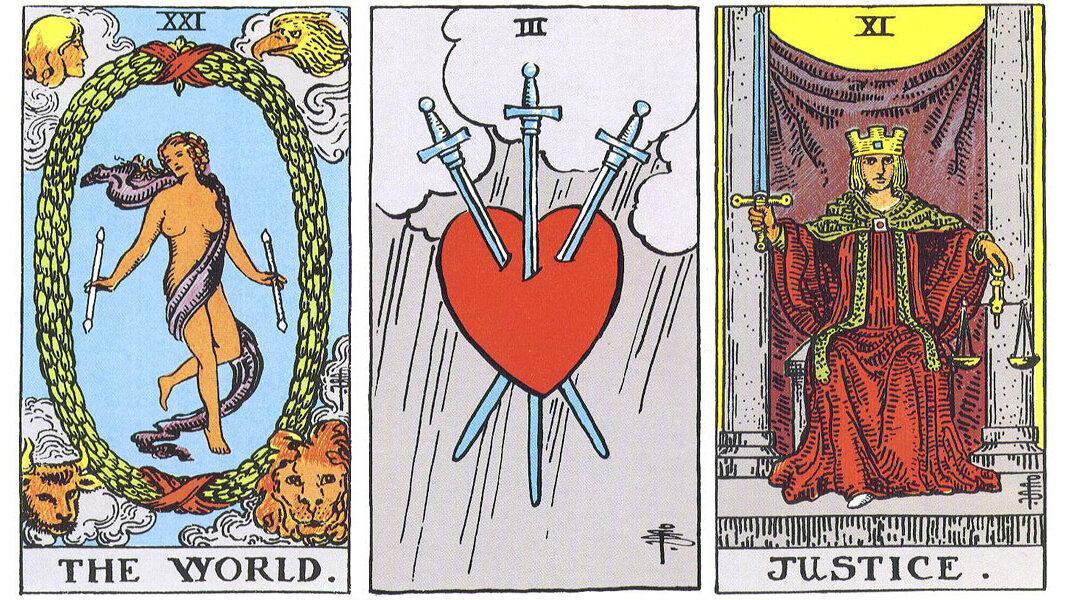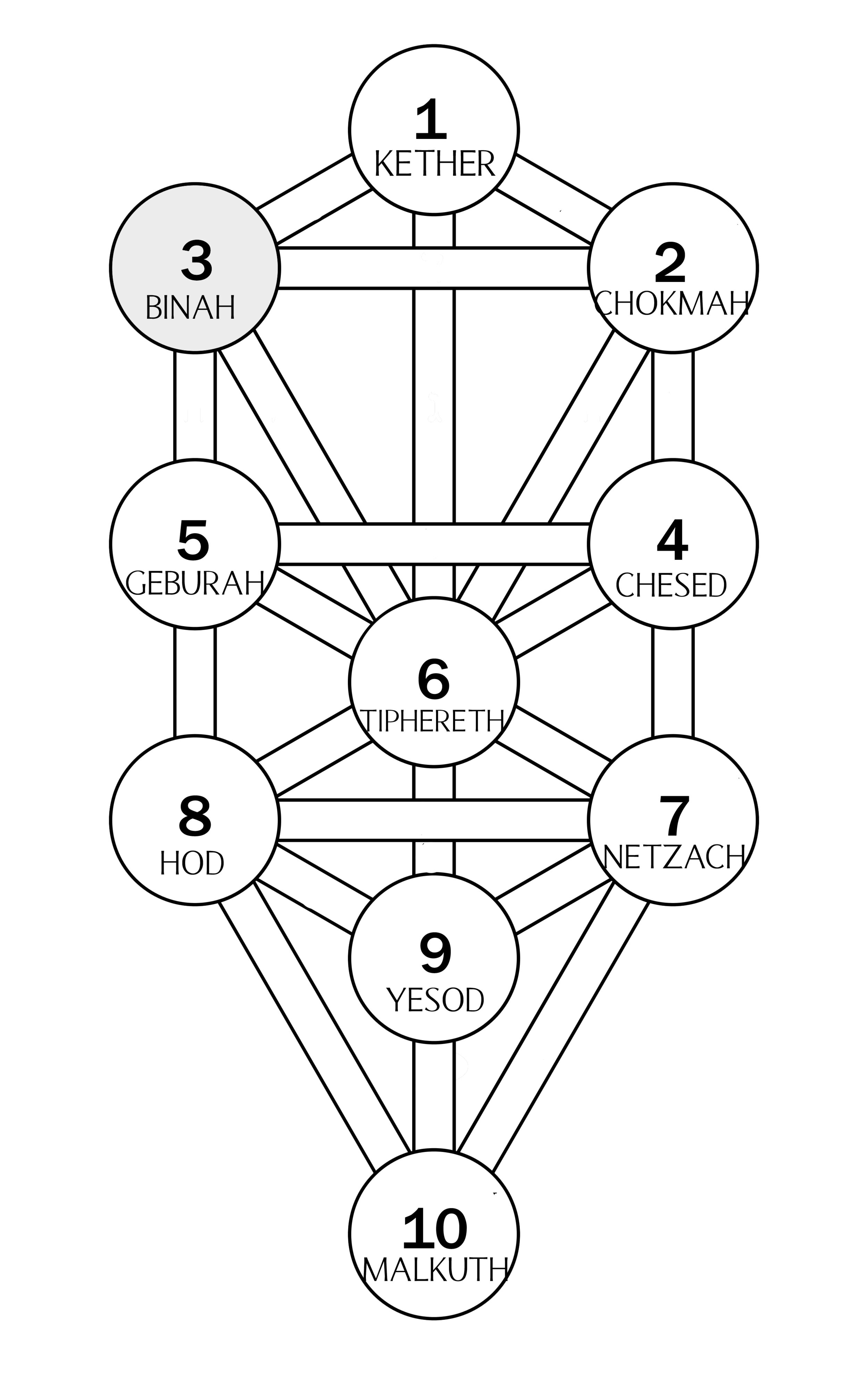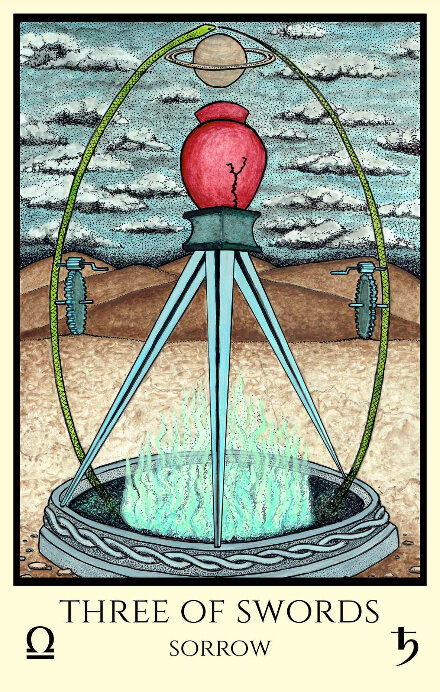3 of Swords: Libra II
Decan ruler (Chaldean): Saturn
Hermetic Title: Sorrow
Corresponding major arcana: The World [Saturn] + Justice [Libra]
Dates: October 2 - October 11
A whiles back I was talking decanic minors with Austin Coppock, and I said this:
"Astrology helps you see beyond the surface of the card in such interesting ways. A really good example of that is the 3 of Swords, which is one of my favorite cards - "
"You and almost nobody else!" interjected Austin - not inaccurately.
It's true, I really do like the 3 of Swords, otherwise known as the "Lord of Sorrow". But this was not always the case. In 1996, when I was first messing around with the cards, I kept notes in this super-tacky spiral notebook covered in purple velveteen. I connected the 3 of Swords with a painful encounter, in which I'd witnessed my ex taking up with someone new on the ballroom floor (I was an avid ballroom dancer in those days). When I got home, I listened to Cannonball Adderley's recording of "Dancing in the Dark" and learned to play it on my saxophone, tears streaming down my fingers and over the valves. (Cue Dumbledore in the Half-Blood Prince: "Oh, to be young, and feel love's keen sting.")
And for many years, that's all it was- other people's heartbreaks, and my own. Visually, the 3 of Swords is easy to parse, and often its stark appearance draws cries of tearful recognition even from those unfamiliar with tarot. Sometimes it's painful to face the inevitable; to know the thing you can't un-know. But over the years I have found that there are many forms of this knowledge, and not all come with pain.
Queen of Sorrows
Esoterically, the 3 of Swords is a particularly interesting case. It is the final decan of the Queen of Swords, and that connection alone could account for her complex and sometimes deadly character. "Black Maria," "Pique Dame," "Calamity Jane"- in playing card lore, the Queen of Spades has more nicknames than any other. More often than not she is a game-ending apparition, a harbinger of doom.
In tarot, the Queen of Swords is traditionally a widow, or divorced. Her three decans - the 10 of Pentacles, the 2 of Swords, the 3 of Swords - could tell a story of legal inheritance through personal loss, if you look at them the right way. When I see her in readings, she will often signify a breakup that's about to happen or has just happened. And although all queens can be self-sufficient, this queen in particular not only needs no partner but very often really does not want one.
The 3 of Swords, Lord of Sorrow, correlates to Binah - the third sphere on the Tree of Life. Binah is known as the Great Mother, for its role as the dark womb giving rise to the Pillar of Form. It is known also as 'Understanding,' and the Palace of Mirrors, for its role in reflecting and developing the insights of Chokmah with the rational mind. It is called the "salty sea" and the "starry sky". Its sorrow is archetypal and saturnine in nature, shaped by the love of creation and the indelible knowledge that all things must end.
So when you meet a clear-eyed, pitiless, worldly, independent-minded woman whose wit kills you dead, you can be sure this living Queen of Swords has known sorrows you can't begin to comprehend. Stay on her good side and you might come away wiser and - if you're lucky - with your head still attached to the rest of you.
The Dancer Faces the Music
In the Golden Dawn's Book T, it is said that the Queen of Swords, besides being "perseveringly accurate in superficial things"(hello, Virgo III decan), is "graceful, fond of dancing and balancing". This airy grace is quite certainly a Libra quality, not only because it is the Venus-ruled air sign. The Libra major, Justice, as we discussed in the 2 of Swords last week, is the dancing partner of the Fool: the structure that shapes elemental air into music. It is the shaping of eternal Time (Saturn) into finite rhythm by Venus. In the 3 of Swords, the World's dancer moves to the music of Justice/Adjustment. Against the steady drumbeat of Saturn's unbreakable bonds ('δεσμους αρρηκτους,' in the Orphic Hymn to Kronos), a harmonious thread weaves the fabric of circumstance, the dance of our timeline.
“There is a crack in everything, that's how the light gets in." - Leonard Cohen
3 of Swords from M. M. Meleen’s Tabula Mundi.
For a little while - a lifetime, maybe, or as long as love shall last, or until your other half becomes the proverbial "ball and chain" - we hold on to one other in the dance, forming connections of choice even whilst our cellular chains of telomeres grow shorter. There are times, though, when we cannot or will not follow the script, when the choreography confines us, when Saturn's chains feel like marionette strings. Then we break our pattern. The 3 of Swords shows how, wittingly or unwittingly, willingly or not, we then pay the price.
Binding Contracts.
When Saturn, lord of commitments and unbreakable bonds, combines with the legal finalities of Libra, the result is a promise. You can think of the three swords as this: the two parties to the agreement - plus the agreement itself. The promise itself, in other words, is the third thing: the deal, the contract, the marriage, the life. As Austin puts it in 36 Faces, "...this face is nearly ideal for the binding of two things together, whether they be people in marriage, business entities, or merely a promise to oneself. It contains the formulae not only for knitting together, but continuing in happy union, and is therefore an arcanum of wonderful power."
Severus Snape makes an Unbreakable Vow.
In the Picatrix we find recurring references to a wedding, or a bridegroom, sometimes a "black man" leading the way (as everyone knows, Saturn's color is black). In contrast to modern interpretations to the 3 of Swords, it is said to denote "relaxation, wealth, good living, security, peacefulness and easy living." And that is why, when a friend of mine drew it in reference to her upcoming nuptials and was a little concerned, it seemed to me like an excellent omen. Saturn is exalted in Libra, and so long as you approach what you commit to with a dose of saturnine and sober judgement, the blessings of this card can last forever.
Personally I have drawn the card on days when I have signed a book contract, as well as when I have fulfilled a contract by its deadline. For me as for many others, swords are words, and I am one of those unfortunate people who cannot go against their own word. If I say I will do something, whether in writing or in speech, I have to do it, in the time and manner specified. So the 3 of Swords, for me, may represent this non-negotiable, Krazy-Glue-type attitude towards verbal commitments - word as bond.
The God of the Land and the Good Life
One rendition of the Latin Picatrix goes like this: Vir sedens in pulchra cathedra togatus, et est quietudinis, ubertatis, et bonae vitae quietae, et securae: "a man ornately dressed sitting in a chair, [signifying] anger against evil, a restful and secure life with an abundance of good." Other translations mention "good living" or "easy living".
This brings to mind the archetype of Saturn as a god of wealth, fertility, and agriculture. The 7 of Pentacles always strikes me as the most agricultural of Saturn minors in the Rider Waite Smith deck, with what might be a farmer brooding over what might be a crop. But the 3 of Swords is worth considering too - for what is farming without rain? Over the years I have repeatedly drawn this card on rainy days. And rainy days seem to me to be of Saturn in two different ways: 1) they literally dampen folks' moods (the melancholy, saturnine temperament), and 2) they bring fertility and abundance to dry land.
The other day, I was picking raspberries in the yard when my daughter got home from school. She asked me why, and I said "Because it needs to be done." A moment later I thought, Well, that was a very Mom thing to say to your teen - the implication being something more like "we all do our chores here and you really should too". When I tried to think of a more neutral way to say it, I came up with "Because it is the right time to do it." The implication being, they're ripe now and if I wait even a day they'll rot; or, the sun's out and if I wait even an hour it might rain.
But - to take it a step further - is there really so much difference between "it needs to be done" and "it is the right time to do it"? Any farmer would say, no. The Justice card governs the right measure of time - the deadline, the interval, the kairos. In the agricultural sense, to have good timing means to be in a contract with the earth itself.
The Wind Telephone
And finally, because tarot is always personal and specific as well as universal, here is one more connection I have made with this card. On January 12, 2017, a rainy Thursday, I drew the 3 of Swords in the morning. Later, I found myself listening to a "This American Life" podcast about the "wind telephone" - a phone booth with an old rotary-dial phone inside, connected to nothing, set up in Otsuchi, Japan. It was set up by Itaru Sasaki, who lost his cousin to the 2010 tsunami: "Because my thoughts could not be related over a regular phone line," said Sasaki, "I wanted them to be carried by the wind." At this kaze no denwa, tsunami survivors go to talk to the loved ones they've lost. A documentary recorded some of the messages, and the tape is riveting. You can hear the loss, the heart cracking open, the release. Many find closure there. To me, the "wind telephone" - that airy device telegraphing insight, closure, recognition of a love that persists even when one link of the chain is broken - is cognate with the 3 of Swords.
Because - and this is hardly news - without attachment, there is no suffering. But who wants to live in a world without love? And where there is love, there will be loss. The 3 of Swords pins us straight through the heart to the things we love and ensures that we will feel them, deeply, when they are gone.
The Takeaway
When you draw the 3 of Swords, there is something you have no choice but to face: hard-won knowledge, irreversible realizations, the thing you can't unknow. It might be the recognition that the relationship is over. On the other hand, it actually might be the recognition that the relationship is the only one, and you are prepared to forsake all others. It could be coming to terms with loss. It could be making a promise. It could just be rain.
Whichever the manifestation, it will be invested with a dark grandeur - it could be sorrow, yes, but it could also be solemnity, as in "solemn vows". When you feel the pangs of Saturn, the weight of Binah, it may help to think of it in the very same way you think of rain: Gloomy for sure, and terrible for parades - but also, the very water of life for everything that sustains us.







